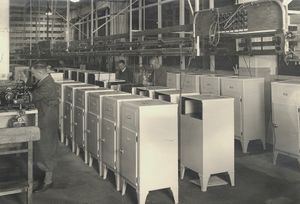Translations:Robert Bosch GmbH/4/en
Robert Bosch opened his "Workshop for Precision Mechanics and Electrical Engineering" in Stuttgart on November 15, 1886.[1] In the early years, he was still carrying out all precision mechanics and electrical engineering work himself. On October 8, 1887, the workshop for the first time supplied the product for which Bosch would soon become famous: the Bosch magneto ignition device for combustion engines, initially at the time for stationary engines. By 1891, the manufacture of the magneto ignition device was already accounting for more than 50 percent of revenue. Despite this, business was often sluggish in the first ten years. Robert Bosch himself later described this time as a "shambles".
The situation had improved by 1895 with the construction of the power plant in Stuttgart.[2] Homes and businesses in Stuttgart were now increasingly supplied with electricity, with the result that the demand for electrical engineering grew rapidly. The 1000th magneto ignition device for stationary engines was produced in 1896 – to mark the day, Robert Bosch invited his employees to a company outing in a nearby hostelry. The following year, the company succeeded in making a technical breakthrough with the construction of magneto ignition devices for automobile engines. The first office outside Germany was opened in England in 1898, followed a year later by branches in France and Austria-Hungary. The greatest success achieved abroad by the Robert Bosch company however was in the U.S. Orders worth over a million dollars were landed on the first U.S. foray. By 1912 at the latest, the U.S. had become the most important sales market for the company with the opening of a local facility in Springfield.[3] When the First World War broke out two years later, the German company lost its entire foreign market. The Bosch properties in the countries of the Triple Entente, material values as well as patents and property rights were confiscated. Production in Germany was switched to armaments.
